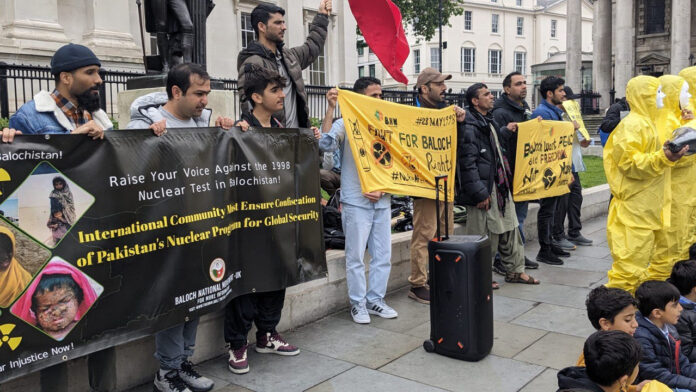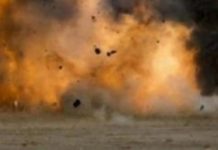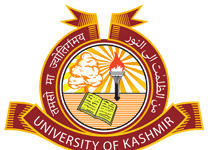London: The nuclear tests conducted by Pakistan 26 years back have resulted in devastating impact on the people and environment of occupied Balochistan where the explosions were carried out, according to Baloch Nationalists.
Pakistan had reportedly exploded 6 atom bombs in Chagai area of Balochistan on May 28 to test its nuclear capability, about two weeks after India carried out underground nuclear tests in Pokhran in Rajasthan.
The nuclear tests have devastated the land, people, animals, and plants, with ongoing detrimental effects, the local Baloch people say.
As a result of the 1998 nuclear tests in Balochistan, the mortality rate of newborns has increased and children have been adversely affected by the radiation, including their physical appearance.
To commemorate the anniversary of the Pakistani nuclear tests as a “Black Day’, Baloch Nationalists, under the banner of Baloch National Movement (BNM), staged a demonstration in London to highlight the damages caused by the radiation emitted by those explosions.
The protest saw participation from BNM members and representatives, as well as members of other organizations, including Baloch, Sindhi and human rights activists, according to a press statement issued by the organisation.
Journalists and activists from various nationalities also joined the demonstration, it said.
During the protest, BNM leaders and members strongly condemned Pakistan’s nuclear tests in Balochistan and called upon the international community to hold Pakistan accountable.
Leader of World Sindhi Congress Dr. Lakhu Lohana remarked that Pakistan is unique in celebrating a day it terrorized the world by testing nuclear weapons in Balochistan without the consent of its people.
For Balochistan, this day remains a black day, Lohana said.
Baloch leader Hassan Dost Baloch said the nuclear tests resulted in cancer and other devastating effects on the people and environment of Balochistan.
Urging the international community to amplify its voices and hold Pakistan accountable for testing nuclear weapons on Baloch soil, he said Pakistan should be brought before the International Court of Justice for this crime.
Representative of the Baloch Republican Party (BRP), Mansoor Baloch, condemned the nuclear tests and accused Pakistan of exploiting Baloch land and resources while aiming to annihilate the Baloch population.
Muslim Deedag, another representative of BRP, discussed the long-term impacts of nuclear weapons.
He drew a comparison with Japan, which, despite being a developed country, still struggles with infertility of land in Hiroshima and Nagasaki decades after the nuclear attacks.
He pointed out that Balochistan, being a colonized region, lacks the resources to recover similarly.
Another Baloch leader Saleem Baloch said the nuclear tests of May 28, 1998, poisoned the land, water, and air, leading to long-term health issues for the local population.
He also spoke about the widespread killings of Baloch political workers, human rights activists, journalists, and civilians by Pakistan.
The protest concluded with a unified call for international intervention. Baloch National Movement demanded that the civilized world recognize the ongoing atrocities in Balochistan and take decisive action against Pakistan’s oppressive policies.
The BNM urged the international community to support the Baloch people’s struggle for justice, freedom, and the preservation of their homeland.








